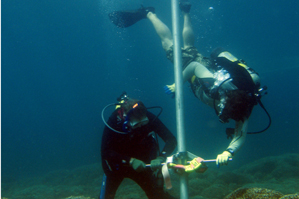Climate change and coral reefs

So results published by Vollmer and his colleagues in Science Magazine today bare both worrisome and promising news. The multi-institutional team, led by Richard Aronoson of Florida Institute of Technology, analyzed 14 sections of reef off the coast of Panama and found that coral growth literally ceased for nearly 2,500 years due to climate change. About 1,500 years ago, however, the reefs began to rebound when climate variability stabilized.
ENSO stands for El Niño-Southern Oscillation, and about 4,000 years ago it was getting a bit crazy. “Clues to the past climate are recorded in the geochemistry of sediments and even coral skeletons,” said Vollmer. “We can date sediments and then determine the ratios of elements like titanium to predict past ocean temperatures.” The team bored 17-foot deep cores out of the reef to read the coral bodies and sediments that had been deposited over millennia. A relatively thin and unhealthy looking layer betrayed a difficult time for the reefs.
Cores from other parts of the Pacific Ocean — including Australia and Japan — have shown similar results and have typically been attributed to local environmental factors. These new results indicate that a more global climate problem was at play.
The results are a bit scary, since we are now entering another era of climate change that could have similarly devastating effects. But there’s a silver lining: we still may have time to fix things. Even after 2,500 years, the coral reefs that were so mangled managed to revive themselves when ENSO calmed down. If we can curb our impact on climate change, there’s no reason to think we can’t also minimize the long term impacts we’ll have on our planet.
![Coring (Vollmer Right)[2]](http://www.northeastern.edu/insolution/wp-content/uploads/2012/07/Coring-Vollmer-Right2.jpg)





